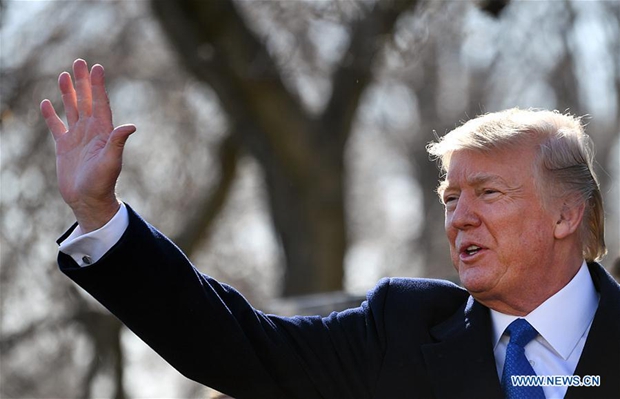?Response to trade disputes at NPC sessions
- By Haifa Said
 0 Comment(s)
0 Comment(s) Print
Print E-mail China.org.cn, March 10, 2018
E-mail China.org.cn, March 10, 2018

U.S. President Donald Trump [Photo/Xinhua]
Chinese officials and delegates gather for the most important annual political event – the first session of the 13th National People's Congress (NPC). The legislative meeting takes place as trade tensions with the U.S. having escalated, following Donald Trump's announcement to place tariffs on steel and aluminum imports of 25 percent and 10 percent, respectively.
The announcement triggered concerns globally that Trump may be heading towards a trade war, as his administration has been showing an increasing inclination towards inwardness and protectionism in line with the "America First" policy.
Earlier this year, China's fast-growing solar sector, the world's largest, has been a primary "target of protectionism" by the U.S.'s imposition of tariffs – up to 50 percent – on imports of washing machines and solar panels.
Trump's earlier decisions of pulling out of the Trans-Pacific Partnership deal (TPP) and renegotiating the North American Free Trade Agreement (NAFTA) come in the same context of this heralded "America First" policy.
In the recently released U.S. national security and defense strategies, China was directly labelled as a growing "threat" to the U.S.'s national security, especially with regard to the hefty deficits in U.S. trade with the Asian rising power, causing, according to Trump, industrial job losses in the U.S. Beijing strongly dismisses Trump's "threat" theory as a "cold war mentality."
The tariff measures have prompted an outcry from the U.S.'s trading partners, as well as from U.S. businesses that rely on the imported products. They are regarded as "regrettable" and in violation of international trade rules by several affected production markets, sparking promises of resorting to legal action in response, including complaining to the World Trade Organization.
Dismissing any intention of a trade war, Trump's argument is that he seeks to protect U.S. local manufactures said to be "hurt" by cheaper imports and foreign competition, create more jobs in the U.S. and not let the U.S. "be taken advantage of anymore."
The administration justifies this protectionist approach on the grounds of what Trump describes as "unfair" trade practices by Beijing, which, to the contrary, has shown serious commitment to its pledged policy of further integration into the world trading landscape and opening up to the multilateral trading system and foreign investors.
North Korea's nuclear file has much to do with Trump's renewed "confrontational" approach towards trade relations with China, which he has so far relatively kept in check, compared to his election campaign threats, out of desire for effective Chinese cooperation over North Korea.
Now, accusing Beijing of allowing oil into Pyongyang in violation of international sanctions against the latter, and facing growing pressure from his anti-China Republican supporters, Trump seems more inclined to take a tougher trade line against Beijing.
Economic observers, however, rule out the possibility of a U.S. trade war, arguing that China, although being the world's largest steel exporter, is only the 11th among the U.S.' largest steel sources, which makes the tariffs "inconsequential," especially since China has already started to cut off steel exports to the U.S. following higher tariffs under Barack Obama in 2016.
However, concerns of a possible trade confrontation with the U.S. are not likely to be taken lightly by China's 5000 lawmakers and political advisors meeting at the annual sessions of the NPC and the National Committee of the Chinese People's Political Consultative Conference (CPPCC), briefly called "two sessions," to formulate China's future economic and political path.
According to Premier Li Keqiang's government work report delivered at the opening of the NPC annual meeting on Monday, China has set an economic growth target of around 6.5 percent in 2018, the same as in 2017, and is focused on achieving high quality growth, reducing financial risks and curbing high level corporate debts to keep its economy stable, in line with President Xi Jinping's vision of making China a "modestly prosperous" nation by 2020 and turning it into an international "strong power" by 2050.
Achieving this stability necessitates "safeguarding" China's interests and rights, as stated in the report, echoing statements by Chinese Foreign Ministry spokeswoman Hua Chunying on China's intention to "take proper measures" against U.S. actions.
Indeed, Beijing has several tit-for-tat options to target various U.S. interests, as China is the second-largest market for U.S. agricultural goods, the largest foreign holder of U.S. treasuries, and among the five largest markets for U.S. cars and transport equipment.
Trade seems to be another reason why all eyes are on the two sessions, which will definitely give clues into China's future course of dealing with trade disputes.
Haifa Said is chief editor of the English Department at the Syrian Arab News Agency.
Opinion articles reflect the views of their authors, not necessarily those of China.org.cn.





